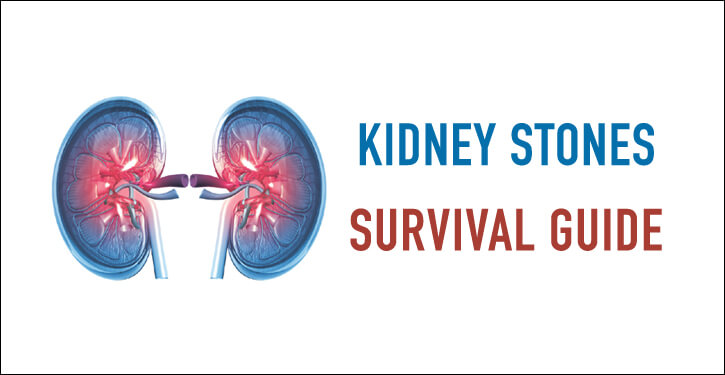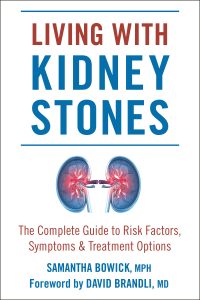One in 10 individuals will suffer from kidney stones at some point in their life. Composed of hard, painful mineral deposits forming inside the kidneys, these stones are both crippling and potentially chronic. Thankfully, patients can take action to reduce their chances of developing or redeveloping kidney stones by following a good diet, observing proper self-care, and adopting a comprehensive wellness plan. To that end, Living with Kidney Stones offers the most up-to-date information on this illness, paired with heartfelt insight from an actual kidney stone sufferer. Author Samantha Bowick has also written several articles to highlight all the important information one needs to know including the “Kidney Stone Survival Guide” below.
Kidney Stones Survival Guide
Have you ever had a kidney stone? A kidney stone is a hard deposit that forms in the kidney from excess substances that are found in the urine. The pain can send you to the floor in an instant and is unforgettable. There are different types of kidney stones caused by different substances. About one out of every ten people will experience a kidney stone sometime in their life. It’s important to know what type of kidney stone you have in order to know what lifestyle changes are needed to be made to decrease your risk as those who have had a kidney stone are more likely to have another one form in their lifetime.
Having a kidney stone can be extremely stressful and difficult to cope with. Being diagnosed with a kidney stone—along with everything else that comes with having the disease—is overwhelming to say the least.
What should you do when you’re diagnosed with a kidney stone? The following is your essential Kidney Stone Guide—10 key actions everyone should take following their diagnosis.
#1 Understand Your Diagnosis
Take a step back and evaluate where your body is. It is important to understand your body and medical information about kidney stones before making any decisions about what treatments to try. Research all available treatment options before deciding on one with your doctor. Do not let your doctor pressure you into any treatments you are not 100% on board with.
#2 Form a Team
You cannot do this alone. From physicians to family, it takes teamwork and specialists to combat kidney stones. Having support is crucial in fighting the pain and stone. On days when we don’t feel like pushing to find the answers, the support people in our lives are there to keep us going. On that note, it is important that you feel like your doctor is listening to you. If you don’t feel this way, it may be time to find a new doctor. Connecting with other people who have also suffered with a kidney stone can be extremely helpful because they understand more of what you are going through, can relate to your experiences, and validate how you’re feeling without making you feel judged. This in itself is a form of healing.
#3 Research, Research, Research
Researching kidney stones and all of the treatment options available (both for the stone itself and the pain it causes) is crucial in finding the treatment that works best for you. Books, websites, and kidney support groups are just a few of the research tools available for people who suffer with a kidney stone. Researching allows you to go into your doctor’s appointment knowing beforehand what treatments you are (and more importantly are not) willing to try so that you don’t feel pressured into doing anything that you think is not best for your body.
#4 Know Your Medications and Treatment Options
There are several different types of medications that doctors may prescribe to try to combat symptoms related to kidney stones: pain medications, antibiotics, bladder medications, medications for spasming, and nausea medications. Doctors can also perform different types of surgery to try to eradicate the stone or the doctor may think it’s best if the patient passes the stone on their own. Know all of your options and which you think would be best for your body.
#5 Keep a List of Your Symptoms
Keeping a list of the symptoms you are/have been experiencing can help you and your doctor determine what is going on and the best course of action. It can also help you remember what to tell your doctor during your appointment as doctor appointments can be overwhelming and cause anxiety.
#6 Know the Risk Factors for Other Diseases
Unfortunately, kidney stones can also come with risk factors, comorbidities, or other diseases. These include, but are not limited to: high blood pressure, interstitial cystitis, diabetes, and obesity. Make sure you know about these in case they come up while you’re suffering with a kidney stone.
#7 Be Kind to Yourself
When you don’t feel well, remember it is okay to take time for yourself, whether it is to sleep/rest, take a relaxing bath, or turn down plans because you are in pain or suffering with other symptoms. Other people may not understand, but that’s okay; they may not know or understand what you are going through, but it is important for you to take care of your body however you think you need to.
#8 Decrease Stress
It is hard to decrease stress, but it is important for people with kidney stones to decrease their stress as much as possible as more stress can lead to more inflammation. Exercise if you are up to it; yoga, reading, writing, and coloring are also good things you can do to try to decrease stress and have a release.
#9 Stay Up to Par Mentally
One of the hardest parts of having a kidney stone is having a doctor take your pain seriously. This can lead to self-doubt, depression, stress, and anxiety. It is important to stay as positive as possible to try to find answers. It may be hard and feel like a second job, but there is a doctor out there who will listen to you. Keep pushing, as this is an important factor in seeking the health care you need.
#10 Stay Committed
Improving your health and daily life requires an unwavering commitment to the principles and tenets of Living with Kidney Stones The most important factor in decreasing your risk of kidney stones is to research and talk to your doctor about your options. It’s important to remember everybody is different and not to give up on finding your answers.
For more articles and information on kidney stones, please click here.
Samantha Bowick has a Master of Public Health degree from Liberty University. She received a Bachelor of Science degree in Health Care Administration at Columbia Southern University. She is devoted to using her education and experiences to advocate for people who suffer with endometriosis and other chronic illnesses. She currently lives in Aiken, South Carolina. She is also the author of Living with Endometriosis and Living with Alpha-1 Antitrypsin Deficiency.






